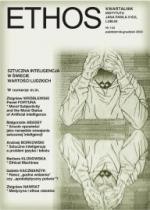 zobacz powiększenie | DOI 10.12887/36-2023-4-144-06 Małgorzata Abassy, Storytelling as a Tool to Tame Artificial Intelligence: Between the Modeling Function of Language and the Subjectivity of Machines Cena brutto: 7,00 PLN za szt. |
|
The article poses a question about the role of narration as a tool for creating reality. The phatic function of language and the significance of primary and secondary systems modeling cultures in the process of taming artificial intelligence were analyzed, based on the source material of two literary texts: Neal Stephenson’s Snow Crash and Machines Like Me by Ian McEwan. The basic research questions signaled in this article concern those areas of perception of reality that are at risk of distorting the axiological foundation and, consequently, the ontological basis. Which of the elements of the storytelling should arouse a particular vigilance of the listener and the narrator? Which themes in Stephenson’s fantasy novel written in 1992 not only became a fact nowadays, but also went beyond the framework outlined by the author’s imagination? Does Adam created by McEwan become the character who was invited to the intimate world of human beings as its equal member? How far are we pushing the boundaries of taming AI beyond eliminating the fear of machine unpredictability? The structure of the article includes an introductory part, a reflection on the semantics of the concepts of taming and artificial intelligence, Snow Crash—as an exemplification of the problem of the primary modeling system, Machines Like Me and the question of the limits of humanity, Katherine Hayles’ and Donna Haraway’s views on the role of narratives, and conclusions. It was noted that the novels selected as a source material for the analysis of the mechanisms of taming artificial intelligence contain premises for reading both fears and hopes placed in technological development. Through their verbalization on the pages of the book, and then visualization in the reader’s imagination, another story is born, giving an impulse to the emergence of a new reality. Taming artificial intelligence, in the light of the presented argumentation would boil down primarily to recognizing the stories that we carry in ourselves and realizing how they condition the connection of new elements. Keywords: artificial intelligence, subjectivity, language, narratives Contact: Institute of Russian and East European Studies, Jagiellonian University, ul. Władysława Reymonta 4, 30-059 Cracow, Poland Pliki do pobrania: » Abassy.pdf | |
